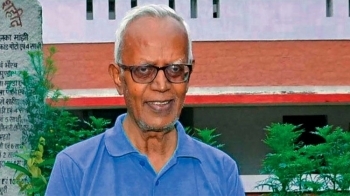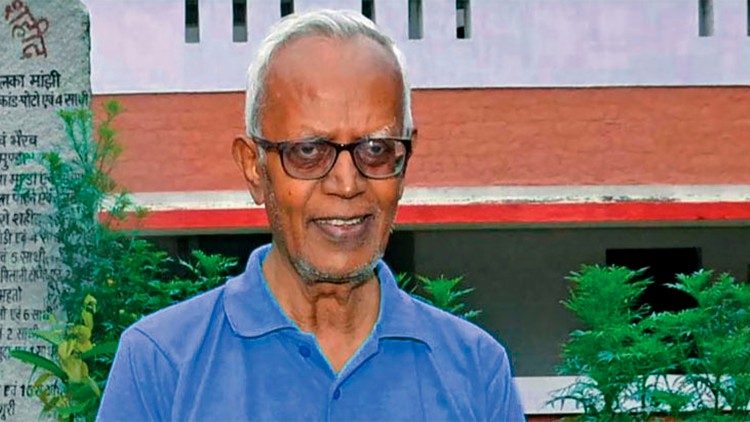
.png) Joseph Xavier
Joseph Xavier

All of us are witnesses to the fact that God glorified Fr. Stan Swamy in his death. A daughter of one of the Bhima Koregaon prisoners met her father in April 2022 in Taloja prison. She told me that during her brief time, as permitted by the jail authorities, her dad was speaking about Stan elaborately. Stan became all for all even in prison by his simplicity of life and high moral thinking. The prison gates curtailed his physical movements but not his spirit and love for humanity. He was well respected as a person and as a Jesuit priest. He bore witness to his faith as a follower of Jesus even inside the prison.
I keep his last conversation with me close to my heart. It provides me with a deep understanding of the reality and meaning to my religious call. Stan was a clear thinker and an articulate person. He would not mince words. On 28 June 2021, from the Holy Spirit hospital Mumbai, he said over the phone, “I am like a child. I need assistance for everything. Take forward the struggles of the Adivasis for dignified life. I surrender myself. Tell the provincials that I belong to the Universal Society. Whatever they decide, is fine with me”. I was speechless. I have observed him having strong intuition. He was able to foresee the future. But he was never perturbed by what would happen to him.
Stan knew that his death was near. Though he wanted to spend the fag end of his life in Ranchi with his friends and Adivasi colleagues, he knew it was not going to happen, given our legal system. Still, he wanted to communicate something from the depth of his heart. He deeply believed that one day Adivasis will have a dignified life. Dignity cannot be snatched away from them. They will struggle for freedom, liberty, and dignity till the end. He also knew that he was only making a small contribution during his life, in their long march towards freedom and dignity. He wanted to give me and all of us a parting message -- “Take forward the struggle for freedom and dignity”.
What puzzled me was also the idea of belonging to a universal society. In the Adivasi culture, it is a belief that when one dies his/her spirit merges with those who have gone before and with the cosmos. I have observed his way of life in Bagaicha, Ranchi. Everyday morning after a meditative walk for about 45 minutes, he would collect some flowers and stand before the ‘pathal’, a stone erected in Bagaicha, in which Adivasi martyrs’ names are inscribed, for 15 minutes in silence. Some flower petals will fall from his folded hands as he could not hold them tight, due to Parkinson’s. At the end, he will respectfully offer the flowers to the martyrs, having his right palm on his chest. Once, out of curiosity, I asked him, “What are you doing, standing still for 15 minutes?” He said, “I am infusing my spirit with the spirit of the Adivasi martyrs.” Stan was tremendously influenced by cosmic spirituality which prompted him to say, I belong to the universal society. For Stan, universal society means, both the Society of Jesus and the larger society, world as one family.
Stan was a strong critique of the hierarchical Church. He felt that the Church has institutionalised and imprisoned the historical Jesus, and consequently deviated from the core mandate of Jesus, to live in solidarity with the poor and sharing everything in common. He wrote from the prison:
Nothing is mine
Nothing is yours
Everything is ours
Lo, this commonality is wrought by compulsion
If only all humans would embrace it freely and willingly
All would truly become children of Mother Earth.
He did not hate the Church but wanted the Church personnel to follow and practise the values and teachings of the historical Jesus more deeply. He felt on many occasions the Church has betrayed the poor by joining hands with the powerful.
In his analysis he distinguished ideology and persons. He would question and challenge dehumanising ideologies and practices but would not hate a person. Even if he did not agree with some persons due to ideological positions, he would deal with them respectfully. From his personal experiences and analysis, he was convinced that the institutional Church will always go with the powerful, rich and rulers, either out of ignorance, fear, to obtain favours or for survival. He knew the Church as a power centre and like any other power centres, the Church would go hand-in-hand with the rich and powerful. Following Jesus is quite different from following the Church.
In the 70’s, when he was the director of Indian Social Institute, Bengaluru, he saw many Dalits tilling the lands of the rich farmers for many years. Land to the tiller policy was promulgated in the country. He demanded the implementation of this policy and joined hands with the landless tillers, who were mostly Dalits. When the struggle was going on, he personally witnessed the Church leadership going with the rich upper caste landowners. The Church leadership demanded his removal from ISI. Fortunately, the Church could not prevail over Stan, as the Society of Jesus recognised the good work of Stan.
He realised that there were contradictions between the life of Jesus and life of the Church. There was a gap between what the Church preached from the pulpit and action. For Stan it was important to follow Jesus rather than the Church. In fact, to faithfully follow Jesus, he kept himself away from the Church hierarchy. When he was planning to establish Bagaicha, in Ranchi, one of the religious congregations wanted to donate him a piece of land. The Church officials blocked the move. However, he had many religious and priests as his friends. Many of them were considered by the mainline church as ‘fringe elements.’ He believed that the ‘fringe elements’ followed Jesus more radically than the hierarchy.
His main mission in Bagaicha was to establish the rights of the Adivasis over land, water, and forest. In the name of development, the lands of Adivasis were taken away forcibly without the consent of the Gram Sabhas. His demand was to follow the provisions of V Schedule of the Constitution and judgements of the Supreme Court. Eventually, he realised that the root cause was the unholy alliance between the corporate, fundamentalist/fascist/Hindutva forces and state power. This alliance had only one religion to follow, namely, profit or money at any cost. He found thousands of Adivasi youth were languishing in prison for no fault of theirs, purely on the ground of suspicion that they were sympathisers of Maoists. He decided to confront the unholy alliance head on through judicial processes. He exposed their overt and covert strategies through his writings. This infuriated the state, which was then ruled by the BJP. The state followed the time-tested strategy of filing a false case against Stan. Stan was implicated falsely in the pathalgadi case. The pathalgadi movement was labelled as an anti-national movement. However, when Mr. Hemant Soren assumed office as the Chief Minister of Jharkhand in 2021, in his first Cabinet meeting the state decided to withdraw the pathalgadi case and called the pathalgadi movement as pro-Adivasi movement. Political junta will recognise you as national if you follow their dictum and will call you anti-national if you confront them. The Church was a mute spectator while all these were happening. The biggest sin of the Church is the sin of omission. In this background one must understand his words, I am not a silent spectator.
The message that we can draw from the life of Stan is very simple. We are called to follow the historical Jesus who emptied himself so that we may experience fullness of life. We must go back to the origin and understand Jesus as a revolutionary, who questioned and challenged all structures of injustice, and stood strong in favour of the poor, the marginalised and excluded. In Taloja prison, he spent his days reading and discussing ‘Jesus – An Historical Approximation’ by Jose Pagoda. He used to discuss with his companions how revolutionary Jesus was during his lifetime and His teachings are even relevant today. His companions, Arun Ferreira and Anand Teltumbde cherished every movement with Stan, living in the small prison cell, though they had not met each other before. He helped them to find Jesus beyond Christianity. By demonstrating what it means to follow Jesus, Stan continues to live in the hearts of many, including those who are in Taloja prison. A Church that is not with the poor is against Jesus. A Church that does not struggle for freedom and dignity of the poor is a counter witness. Those imprisoned in the Bhima Koregaon case (known as BK-16), who are still languishing in prison, are not Christians but follow Jesus. They pay the price for refusing to be silent spectators. The Church has much to learn from BK-16.
(The writer is the Director of Indian Social Institute, Bengaluru)